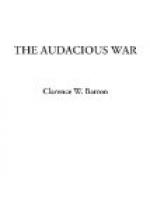The Russians expect the war will be over before next autumn, but Kitchener does not plan to end it then. He means to do this job thoroughly, and his plans are most comprehensive.
CHAPTER X
THE ENGLISH POSITION
A Quiet London—The Call to Arms—No Mourning—The Zeppelin Scare—German Spies—The German Landing—Kultur War Indemnities.
It is worth a winter trip across the Atlantic to stand with a London audience and hear it respond to the call, “Are we downhearted?” with a thunderous “No!”
It is then you first realize that the British Empire is at war; and what that war means; and that that Empire has piped to its defense a free people inhabiting one fifth of the territory of the globe.
The British Empire has war upon its hands a major part of the time. It may be in the Soudan; it may be in South Africa. From some quarter of the globe war is almost always before the Empire. But a war summoning the whole British Empire to arms on land and sea,—that has not been dreamed of for a hundred years.
You expect to find in London an armed camp, the flags flying, the drums beating, the troops marching; an excited people discussing causes and effects of the military and naval programmes; military encampments with white tents over the plains. But you find nothing of the sort. If you attempt to motor in the country and figure on reaching a certain place in two hours, you may find it takes you four, as you are very likely to run into troops, companies, regiments, and armies in training, but mostly without arms and only partially uniformed. They are trudging the highways and the lanes of England from 5.30 A.M. until dusk,—rain or shine. Here is Kitchener’s army being put into condition, with no fuss, feathers, or trumpet beats. The army is “rolling up” and “hardening up.” But not on the tented campus. It is quartered in the towns and villages all over England, and board and lodging is regularly paid by the government.
There are no noticeable drum beats over England; no displays of bunting. Monuments, public buildings, and conspicuous corners, and, most conspicuous of all, the glass fronts of the taxi-cabs, bear signs calling the men of England to arms:—
“Fall in—Join the Army at once.”
“Your King and Country need you. England expects that every man this day will do his duty.”
“Enlist for the duration of the War.”
“Enlist for three years.”
“You are needed to fight for Honor and the Country’s defense.”
“No price can be too high when Honor and Freedom are at stake.”
“Who dies if England lives?”
“He gives twice who gives quickly—join at once.”
“’More men and still more until the enemy is crushed.’—Lord Kitchener.”
And many more of the same tenor. Beyond these you will see little evidence in the London streets of an empire at war. Hotels are largely empty; managers very polite; restaurants must close at 10. P.M.; no after-theater supper at the hotels unless you are a guest. Men in khaki uniforms are more conspicuous; and bandaged heads, slung arms, and legs assisted by crutches are more noticeable than formerly.




